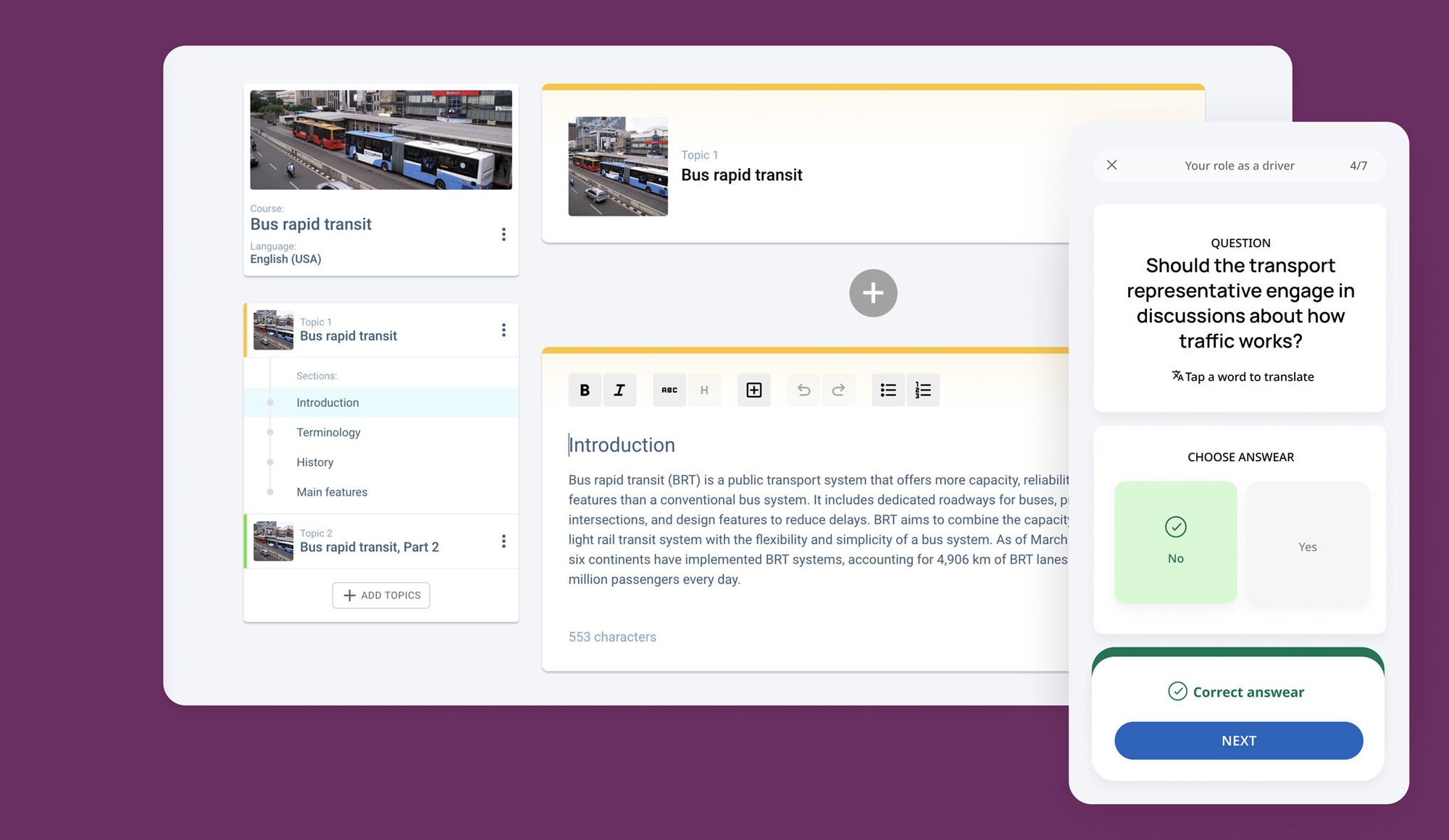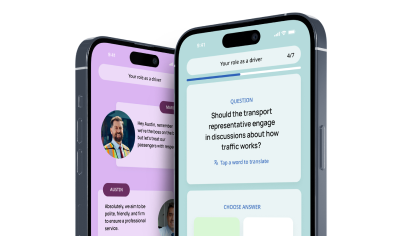15 top-rated diversity and inclusion online courses to consider taking in 2024
It’s time to explore our top picks for diversity and inclusion online training courses. Each course includes a detailed overview, key learning outcomes, and the intended audience to help you find the most suitable ones. Let’s explore our options one by one.
Understanding and managing conflict and polarisation is crucial in today's interconnected world. This is one of the top free online courses on diversity and inclusion offered by Jesus College, University of Cambridge, and explores the triggers and impacts of polarisation across various aspects of life, including the modern workplace. Utilising business, behavioural science, and political expertise, the course aims to provide learners with the skills needed to bridge divides and foster collaboration. It runs for six weeks, with an expected commitment of 2–4 hours per week, and offers an optional upgrade for additional resources and certification.
Key learning outcomes
- Learn why polarisation occurs, creating ingroups and outgroups, and how it extends to different life areas.
- Gain insights into how technology influences polarisation, both positively and negatively.
- Develop the ability to evaluate complex situations and lead efforts to bridge divides.
- Identify your role in polarisation and learn to manage it effectively.
- Acquire strategies for resolving conflicts in the workplace, at home, and beyond.
Suitable for
This course is ideal for working professionals, community leaders, and anyone interested in understanding and mitigating the effects of polarisation. It caters to individuals seeking to enhance their conflict resolution skills and improve group dynamics in various settings.
Knowing personality types and leveraging emotional intelligence are key components of effective teamwork. "Personality Types at Work," offered on Coursera, helps individuals better understand themselves, their teams, and their organisations. This beginner-level course spans three weeks and offers a flexible schedule of seven hours per week. It is free to audit and includes all materials except graded items.
Key learning outcomes
- Develop a comprehensive understanding of different personality types and their impact on workplace dynamics.
- Learn strategies to leverage emotional intelligence for personal and team success.
- Create actionable plans for personal development, team improvement, and organisational growth.
- Gain insights into crafting compelling cover letters and preparing for challenging interview questions.
- Master the skills needed to conduct effective 360-degree reviews and manage team dynamics.
Suitable for
This course is useful for job seekers who want to improve their application materials and interview performance, team members who want to highlight their strengths and confront their weaknesses, and managers who want to create effective action plans based on personality insights.
Effective leadership in today's diverse workplaces requires a deep understanding of equality and inclusion. This course, offered on Udemy and created by business psychologist Robin Hills, focuses on addressing unconscious bias with emotional intelligence. It includes 3 hours of on-demand video, some articles and downloadable resources and offers full lifetime access on mobile and TV. For approximately $6, participants can earn a certificate of completion and enhance their leadership skills.
Key learning outcomes
- Identify how equality, diversity, and inclusion lead to better organisational outcomes.
- Develop the six key traits of inclusive leaders.
- Understand and manage unconscious bias in the workplace.
- Improve communication across various cultures.
- Apply emotional intelligence to enhance leadership capabilities.
Suitable for
This course is ideal for anyone in a workplace environment who wants to understand their role in promoting equality, diversity, and inclusion. It is especially beneficial for leaders seeking to improve the cultural competency of their organisations, those responsible for managing teams to achieve better performance, and individuals interested in enhancing their inclusive leadership skills.
Many organisations have made significant strides in diversity and inclusion, but progress often feels slow and insufficient. This course, taught by Dereca Blackmon on LinkedIn Learning, addresses this challenge by teaching participants how to advocate for more resources, support, and integration of DEI into core business functions. This intermediate-level course lasts about an hour and is accessible with a LinkedIn Premium subscription. It focuses on creating a persuasive narrative to illustrate how diversity enhances recruitment, retention, and innovation.
Key learning outcomes
- Learn to translate diversity facts and figures into a compelling narrative for decision-makers.
- Understand how to advocate for increased DEI resources and support within your organisation.
- Develop strategies to integrate DEI into core business functions.
- Explore ways diversity can enhance recruitment, retention, and innovation.
- Gain skills to generate buy-in for DEI initiatives from leadership and stakeholders.
Suitable for
This course works for DEI professionals, HR managers, organisational leaders, and anyone seeking to advocate for more robust DEI resources and support within their organisations.
5. Discrimination and Diversity in the Modern Workplace Course by the University of California, Berkeley on edX
This introductory DEI online course on edX helps professionals navigate complex group dynamics, communicate effectively in challenging situations, and make equity-consistent decisions. It is an 8-week, self-paced program requiring 5-8 hours per week and is free with an optional upgrade for certification. Developed by UC Berkeley professors, it adapts the latest research to address workplace policy and ethical and cultural challenges.
Key learning outcomes
- Identify and respond to biases in the workplace.
- Understand the perspectives of minoritised employees.
- Implement equitable hiring and evaluation practices.
- Chart a course from unbiased to anti-biased actions.
- Create a climate of equity and belonging.
Suitable for
This course is great for executives seeking to drive meaningful change and improve DEI strategies in their organisations.
6. Best Practices in Planning DE&I Interventions by Rice University on Coursera
This actionable course, offered by Rice University via Coursera, provides a step-by-step approach to planning and executing effective diversity initiatives. It can be accessed for free with a paid certificate option and includes approximately 5 hours of on-demand content. The course helps organisations move from principle concepts to practical applications in DE&I efforts.
Key learning outcomes
- Understand the challenges of DE&I strategic planning and develop effective processes.
- Explore strategies for intentional and legally compliant DE&I recruitment.
- Examine and improve DE&I retention programs.
- Identify and overcome common struggles in implementing DE&I training.
Suitable for
This course is ideal for HR professionals, organisational leaders, and DE&I practitioners aiming to enhance their diversity initiatives. It can boost your recruitment, retention, and training processes.
7. Digital Diversity and Cross-cultural Communication Course on Udemy
Effective cross-cultural communication is vital in today's globalised and digital work environment. This course, available on Udemy for around $6, equips professionals with the skills to build and manage diverse, high-performing digital teams. With 2 hours of on-demand video and lifetime access, this course provides actionable insights into enhancing team dynamics, communication, and productivity across different cultures.
Key learning outcomes
- Design dynamic, diverse digital teams and foster a collaborative corporate culture.
- Implement a communications matrix to target audiences effectively.
- Build resilient and productive teams across borders, time zones, and language barriers.
- Use communication tools to hit target markets with the right message.
- Run successful cultural diversity training sessions and lift performance.
Suitable for
This course is ideal for project managers, diversity and inclusion managers, HR professionals, global business leaders, and anyone working with remote or hybrid teams. It benefits those aiming to enhance cross-cultural communication, team engagement, and productivity in a global marketplace.
8. Psychology of Diversity by Study.com
Diving into the psychology of diversity offers critical insights into human behaviour and societal dynamics. This engaging course delves into topics such as racism, discrimination, stereotypes, and cultural competence. Approximately 12 hours of on-demand content combines theories and research to comprehensively understand diversity. Flexible access allows learners to study anytime, anywhere, making it an ideal resource for those looking to deepen their knowledge and apply it practically.
Key learning outcomes
- Understand social identity and categorisation theories.
- Explore different types of diversity in psychology, including racial, ethnic, gender, and sexual diversity.
- Examine the psychological study of diversity, including modern research and theories.
- Analyse racism, discrimination, and biases.
- Learn about multiculturalism, cultural relativism, and cultural competence.
Suitable for
Students can enhance their understanding of diversity for exams and assignments. Educators will find it useful as a supplemental teaching tool. Professionals can improve job performance by expanding their knowledge of diversity in psychology.
9. Supporting Diverse Innovation by FutureLearn
As businesses and governments seek technological solutions to global challenges, the importance of diversity and inclusion in fostering innovation has never been clearer. This online resource helps learners develop better products and services by amplifying diverse voices and cultivating inclusive cultures. It is an introductory-level course that spans three weeks, with four hours of study per week and is entirely online. Participants earn a digital certificate upon completion.
Key learning outcomes
- Understand what diverse innovation is and why it matters.
- Identify best practices for fostering diverse innovation.
- Explore the social and economic benefits of diverse innovation.
- Learn to create fair and inclusive work cultures.
- Develop strategies to support diverse innovation in your own context.
Suitable for
This course is particularly beneficial for recruitment, user research, implementation, and marketing professionals who want to integrate diverse innovation into their processes. It's also relevant for tech students, such as those studying computer science or design, looking to adopt inclusive practices in their future careers.
10. Diversity and Inclusion for HR Professionals by the University of California, Irvine on Coursera
This course empowers HR professionals to craft effective Diversity, Equity, Inclusion, and Belonging (DEIB) plans. It is free to audit and offers a paid certificate option. The course includes four comprehensive modules that cover the impact of DEIB on company culture, strategies for creating an inclusive environment, and methods to combat biases and enhance innovation.
Key learning outcomes
- Recognise the impact of DEIB on company culture.
- Understand how conscious and unconscious biases affect the workplace.
- Identify how thought diversity supports innovation and challenges conformity.
- Develop a comprehensive DEIB plan for your organisation.
- Explore why innovation is crucial for future success.
Suitable for
The course is intended for HR professionals seeking to improve their DEIB skills. It also benefits business leaders and managers focused on creating inclusive workplaces and driving innovation.
11. Gender and Sexuality: Diversity and Inclusion in the Workplace Course
Understanding gender and sexuality is essential for fostering an inclusive workplace. This free online course, offered by the University of Pittsburgh on Coursera with a paid certificate option, spans three weeks and requires five hours per week. It introduces key concepts related to gender, sexuality, and LGBTQIA identities, exploring their implications in the workplace and broader society.
Key learning outcomes
- Understand the definitions and significance of sex, gender, and sexuality.
- Explore the evolution of gender and sexuality concepts over time.
- Analyse the impact of LGBTQIA identities on workplace dynamics.
- Examine the history and current issues of gender and sexual identity discrimination in the workplace.
- Learn about transgender identities and their implications for workplace inclusivity.
Suitable for
This course benefits HR professionals, managers, and anyone interested in promoting diversity and inclusion in the workplace. It is also valuable for individuals seeking to understand the evolving concepts of gender and sexuality and their impact on work culture and policies.
12. Strategies to Improve and Incorporate Diversity, Equity, and Inclusion in Healthcare by Stanford Online
Enhancing diversity, equity, and inclusion in healthcare is essential for fostering a more inclusive and effective medical environment. Offered by Stanford Online, this course provides healthcare professionals with the tools to build and sustain recruitment practices that enhance DEI. Spanning four weeks, with 2-4 hours of self-paced study per week, this free course with an optional upgrade covers the importance of diverse teams, strategies to foster inclusivity, and the impact of microaggressions in healthcare settings.
Key learning outcomes
- Understand how biases impede DEI in healthcare and their consequences.
- Explore strategies to mitigate personal and systemic biases in recruitment.
- Learn the impact of microaggressions on patients, providers, and team members.
- Develop skills to repair relationships and address exclusion in the workplace.
- Analyse methods to drive meaningful change in the healthcare environment.
- Reflect on measuring the success of DEI initiatives.
Suitable for
This course is designed for healthcare professionals seeking to improve DEI within their teams and workplaces. It benefits those involved in recruitment, team management, and policy implementation.
13. Diversity and Inclusion in the Built Environment by CIOB Academy
To create buildings and spaces that truly serve all communities, the construction sector must embrace diversity and inclusion. This course, offered by the Chartered Institute of Building (CIOB) Academy, explores the importance of promoting diversity and inclusion in the built environment. Over three weeks, with two hours of study per week, participants will learn about the benefits of diversity, the barriers to representation, and strategies to create an inclusive workplace. The course is free with an optional paid certificate.
Key learning outcomes
- Understand the definitions and importance of diversity and inclusion.
- Explore the benefits of diversity for business performance and ethical objectives.
- Analyse the current state of representation in the built environment sector.
- Identify barriers to diversity and strategies to overcome them.
- Develop practical approaches to promote diversity in the workplace.
Suitable for
This course is designed for professionals in the construction and built environment sector at all levels. It benefits those committed to addressing underrepresentation and fostering an inclusive workplace.
14. Leadership for an Increasingly Diverse World by the University of Notre Dame
This course, offered by the University of Notre Dame, guides leaders in developing these crucial skills. With approximately 23 hours of content, it is available for free with an option to earn a paid certificate. The course helps participants understand DEIJ concepts and implement them effectively in their organisations.
Key learning outcomes
- Understand diversity, inclusion, equity, and justice in the workplace.
- Develop self-awareness about personal diversity and its influence on leadership.
- Learn to integrate diverse identities and become a more inclusive leader.
- Reflect on personal and professional experiences with DEIJ.
- Design and implement justice-seeking practices in your leadership role.
Suitable for
This course is designed for professionals in corporate and nonprofit sectors who want to enhance their leadership skills by promoting DEIJ within their organisations.
15. Global Impact: Cross-Cultural Management by the University of Illinois at Urbana-Champaign
This course, offered by the University of Illinois at Urbana-Champaign, equips managers with the skills to lead teams from varied cultural backgrounds. It is beginner-level, spanning approximately 18 hours, and offers a flexible schedule to learn at your own pace. It covers the fundamentals of multicultural management, focusing on how culture influences communication, leadership, negotiation, and teamwork.
Key learning outcomes
- Understand how national cultures impact managerial activities such as communication, teamwork, negotiation, and leadership.
- Detect cultural differences and learn how to prevent and solve misunderstandings.
- Use "The Culture Map" to compare the cultures of different countries.
- Develop skills to diagnose cross-cultural issues and reach compromises.
Suitable for
This course benefits managers and professionals working in multicultural environments who must effectively navigate cultural differences. It is also ideal for individuals seeking to enhance their cross-cultural communication and management skills to lead diverse teams better.





